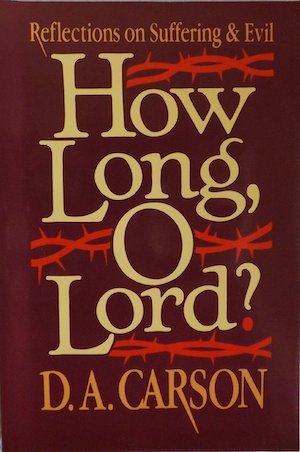 Be prepared! That is the key message of this helpful book on suffering and evil by Don Carson. When days of darkness come upon us (which they will), we need to have in place ‘as stable a set of beliefs as possible on these matters’, and we need to ‘learn how to use’ these beliefs, in order ‘to find comfort in them’ (pp. 20-1). The aim of the book is primarily pastoral. It is aimed at ordinary Christians, and is intended to equip them with some clear convictions that will help them when they face suffering.
Be prepared! That is the key message of this helpful book on suffering and evil by Don Carson. When days of darkness come upon us (which they will), we need to have in place ‘as stable a set of beliefs as possible on these matters’, and we need to ‘learn how to use’ these beliefs, in order ‘to find comfort in them’ (pp. 20-1). The aim of the book is primarily pastoral. It is aimed at ordinary Christians, and is intended to equip them with some clear convictions that will help them when they face suffering.
(I have been reading the first edition, from 1990. There is a second edition, from 2006, which seems not to be substantially different.)
The heart of the book consists of eight chapters on biblical themes. The key points are clear. All suffering (human suffering, that is; I don’t think animals are mentioned) is a consequence of sin and the fall. This includes ‘natural evil’ (p. 43). But, except in some obvious cases, there is no direct link between the suffering a person experiences and that person’s own sin. So we should not be taken by surprise when we experience extreme suffering. We live in a fallen world, and ‘it is only because of the Lord’s mercies that we are not consumed’ (p. 62). Topics covered include poverty, war, natural disasters, persecution, illness, and bereavement.
Job is presented as an example of someone who continued to trust God in the face of ‘irrational evil, incoherent suffering’ (p. 154). The Book of Job makes it clear that ‘God does not blame us if in our suffering we frankly vent our despair and confess our loss of hope, our sense of futility, our lamentations about life itself’ (p. 160).
What, then, are the convictions and beliefs that will sustain us through suffering?
On the one hand, there are beliefs about God: that he is entirely good, that he is entirely sovereign, and that he will cause justice to be done in the end. Our cry in suffering is, ‘How long, O Lord?’
But on the other hand, there are beliefs about human responsibility. We make meaningful decisions, and those decisions have significant consequences.
And these two sets of beliefs need to be held together, without leaning in one direction or the other. We need to hold on both to divine sovereignty and to human responsibility.
Carson argues that it is possible to hold these two truths together in the meatiest chapter of the book, on ‘The Mystery of Providence’. There is no contradiction here: God is good, and it is our fault that there is evil in the world. Evil is ‘always chargeable to secondary agents, to secondary causes’, whereas good ‘is always chargeable to [God], and only derivatively to secondary agents’ (p. 213). But there is mystery here: we are not told God’s reasons for permitting the existence of evil. However, as long as we properly locate the mystery, and as long as we cling firmly to the truths that are clearly revealed about God and humanity, we can learn to cling onto God during times of darkness.
This is not a particularly theological book, nor one that tackles many of the difficult questions (such as those related to the natural sciences). But it is deeply pastoral, practical, biblical, and helpful.